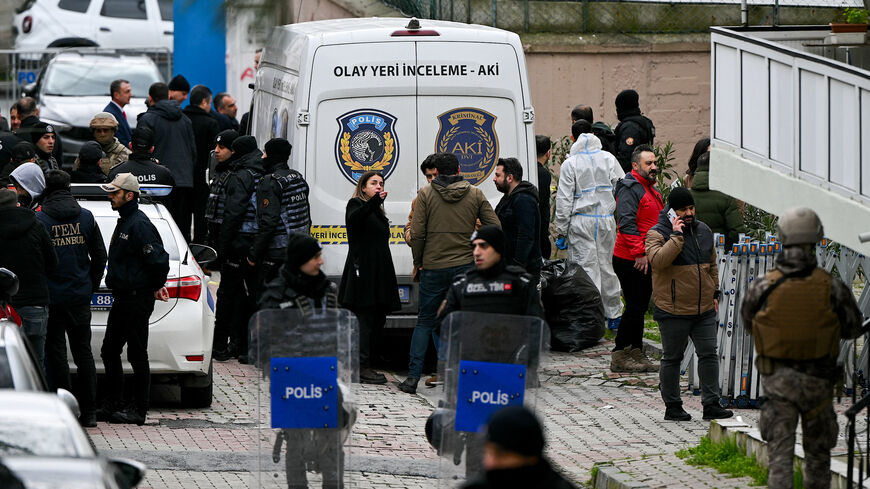Iran announces arrest of 14 ISIS members across several provinces
Iran has repeatedly launched arrest campaigns against suspected members of the Islamic State’s regional branch, which has been behind a series of deadly attacks in the Islamic Republic.

Iran’s Intelligence Ministry on Friday announced that a series of raids around the country had resulted in the arrest of 14 people allegedly affiliated with the Islamic State and planning “terrorist attacks” in Iran.
In a statement carried by the official Islamic Republic News Agency, the ministry said security forces had carried out the arrests in Alborz, Fars, Khuzestan and Tehran provinces, without specifying when the suspects were detained.
According to the ministry, the 14 people detained belong to ISIS-Khorasan, a branch of the Sunni militant group active in south-central Asia, and had entered Iran illegally in the past few days with the aim of carrying out “terrorist operations.”
The identities and nationalities of the detainees have not been disclosed. The ministry added that details of the investigation will be revealed at a later time.
Islamic State in Iran
Based in Afghanistan, ISIS-Khorasan was founded in 2015 by former fighters from various militant groups, including the Taliban and al-Qaeda.
Considered one of the most violent branches of ISIS, the group, initially conducted attacks in Afghanistan and Pakistan against civilians, mainly targeting Shiites. It later expanded its operations, claiming responsibility for a series of attacks in Iran.
Most recently, ISIS-Khorasan claimed two explosions in January that rocked the south-central Iranian city of Kerman. The blasts took place near the cemetery where Qasem Soleimani, the slain commander of the Islamic Revolutionary Guard Corps' Quds Force, is buried.
In a statement posted on its Telegram channel at the time, ISIS-Khorasan said two of its members had detonated the explosives vests they were wearing, doing so when thousands of people were at the cemetery to mark the fourth anniversary of Soleimani's death in a 2020 targeted drone operation by the United States in Baghdad.
The ISIS-Khorasan attacks killed at least 84 people and injured more than 200 others.
Iran blamed ISIS-Khorasan for an armed attack in August 2023 at the Shiite Shah Cheragh Shrine, in the southern city of Shiraz, where a gunman killed two worshipers and wounded eight others. The shrine had been the site of a similar incident that left 14 people dead, including the shooter, in October 2022.
The group did not claim responsibility for that operation. It did, however, take credit for a mass shooting at the same shrine in October 2022 in which 15 people were killed.
The first operation ISIS-Khorasan claimed in Iran took place in June 2017, when militants carried out simultaneous attacks in the capital, Tehran. Suicide bombers detonated devices near Ayatollah Rouhollah Khomeini's mausoleum, while gunmen opened fire in the parliament building. The attacks left 18 people dead.
Iran has been cracking down on the Sunni radical group, with officials occasionally accusing Israel of operating through ISIS to attack the Islamic Republic. In August 2022, the Intelligence Ministry charged Israel with attempting to “carry out its terrorist operations through takfiri ISIS teams.” Iranian authorities use the term “takfiri” to refer to Sunni extremists.
In April in Karaj, west of Tehran, Iranian authorities arrested at least three ISIS members, including Mohammad Zaker, a senior operative of the Khorasan branch. Several months earlier, in January, police had nabbed 35 people, including an ISIS-Khorasan commander, for alleged ties to the twin bombings in Kerman.
In July 2023, Iranian authorities executed two men accused of being behind the 2022 Shiraz attack. Eight people linked to ISIS were hanged in July 2018 for involvement in the 2017 attacks in Tehran.
Friday’s announcement came as tensions in the region reached new heights, following the assassination of Hamas political leader Ismail Haniyeh in Tehran on July 31 in an attack blamed on Israel. Haniyeh was reportedly killed by a bomb planted in the guesthouse where he was staying while in the capital for the inauguration of President Masoud Pezeshkian.
Iran and its proxies in the region, including Hamas and Hezbollah, have vowed a harsh response against Israel for Haniyeh’s assassination.






